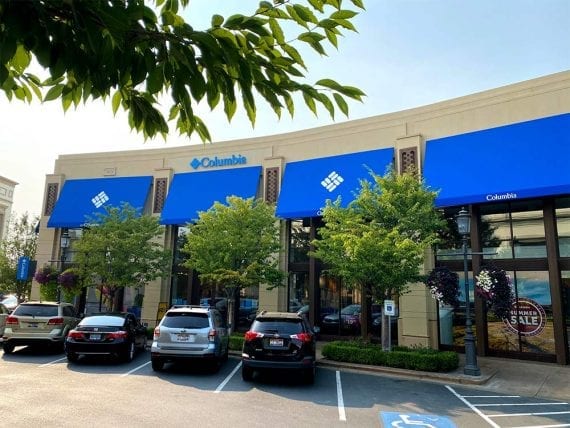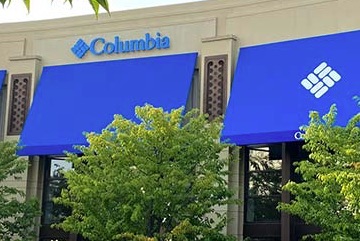The coronavirus pandemic has accelerated the pace of digital transformation in retail, prompting some brands to focus on direct-to-consumer channels.
The retail and wholesale industries have long been undergoing an evolution toward ecommerce, digital brands, and DTC sales. But Covid-19 changed retail abruptly, forcing retailers and brands to make significant changes in their business models years ahead of when they might otherwise have planned.
DTC
In 2016, Coach, the luxury purse maker, parted ways with some retailers. In 2018, Dior announced that it was pulling out of selling wholesale. Carhartt, a workwear brand, and Columbia, a sportswear company, have both opened retail outlets to compete head-to-head against their retail customers. And in 2020, Gucci said it would reduce the share of its sales in the wholesale channel.

A Columbia direct-to-consumer retail store in the Village at Meridian, a few miles west of Boise, Idaho. A Carhartt retail store is two doors down. A Nike shop is less than half a mile away. Author image.
Market-driven
This trend was market-driven.
“Many brands are very focused on DTC due to the ongoing struggles of their wholesale accounts — retailers. They need to control the relationship with the customer and drive their business without being beholden to an increasingly challenged model of wholesale-retail,” said Brian Walker, chief strategy officer at Bloomreach, an ecommerce experience platform.
“Amazon and other marketplaces also amplify the urgency as they commoditize the market with private label and pseudo-brands that increasingly compete with name brands on these marketplaces. The benefits for the [private label] brands are clear in increased margin from the low teens to 50-70 percent. Thus even if unit sales are lower, having the customer relationship and data gives them control over their future,” Walker said.
This last point, having the customer relationship data, is especially important given how an increased focus on privacy could impact performance marketing in the coming years.
Covid-19
When retailers temporarily closed their doors this spring, manufacturers may have realized just how vulnerable their supply chains were.
“There are quite a few trends that we’re seeing in the market. The idea of going to a department store — Macy’s, Nordstrom — I think that’s very much dying off,” said Peter Sheldon, senior director of commerce strategy at Adobe, who I interviewed in the context of how the pandemic could impact retail in the near term.
“If we look at today’s millennial consumers, they are very engaged in what we would call digital-native brands, the Warby Parkers of the world, or Glossier. These are firms that have created a digital brand, and, yes, they have some retail stores. But they’re not retail stores in the traditional sense, [with] a massive distribution channel. They’re direct-to-consumer firms. They don’t sell through wholesale or, [if they do], it might be a minor part of their business. They are selling directly to the consumer. Their primary channel is online, digital, and if they have stores, they are experience centers — experiential, premium showrooms — where they’re not necessarily interested in selling you something. They are following the Tesla model.
“There are some great examples. Look at Canada Goose, which makes big, expensive jackets. They’ve been investing in their direct, corporate retail channel, but it’s all about these experiential centers where consumers can walk into this minus 30-degree freezer room and try on a jacket. [The trend is toward] that type of stuff,” Sheldon said.
These sorts of manufacturers “are driving a lot of the sales to happen digitally. You might be in an experience center, but you cannot actually buy anything. You can’t walk out with the product. They are going to say, ‘Hey, you like the product, great. Buy it, and it will be on your doorstep in two hours.’ So there is a big shift toward that,” Sheldon said.
Brands that have traditionally sold through the wholesale channel, relying on brick-and-mortar or even omnichannel retailers, may look at “digital native” companies with envy in 2020.
“We see across the board…[brands] are pulling back on wholesale … this idea that 80 percent of our business is wholesale. That’s dying very, very quickly,” Sheldon said.
“It’s almost a double whammy for all of those department stores — retailers that traditionally buy wholesale. The manufacturing brands are [saying], ‘We don’t even know if we want to be in the wholesale game anymore. We just want to go direct to consumer.’”
No Retail Apocalypse
Sheldon added that the DTC trend is not “the retail apocalypse,” meaning that we should not expect traditional retail to vanish tomorrow. But both manufacturing brands (traditional wholesalers) and retailers should be mindful. The direct-to-consumer model will likely impact their long-term strategies.







